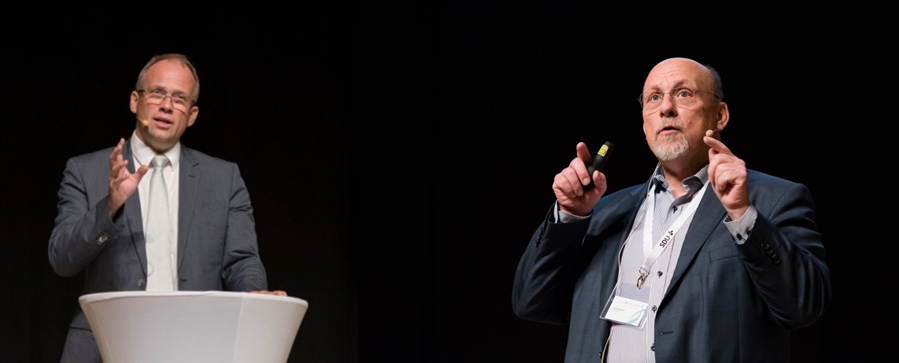
Climate conference reached important conclusions
'100% Climate Neutrality' at Alsion attracted over 400 participants from all over Europe
The participants learned about the latest research in sustainable energy, and it was made clear that governments and countries alone cannot solve climate problems - support is needed from civilians, industry, towns and municipalities.
It's about what kind of world we leave to our children. Action has to be taken now! I refuse to live in a world of ignorant people who don't take climate problems seriously. I don't care where they are from or of which country they are President!
Henrik Dam, Vice Chancellor of SDU, spoke in capital letters when he took the stage to welcome participants to this week's climate conference at Alsion in Sønderborg. The conference was arranged by SDU's Mads Clausen Institute in Sønderborg along with Hochschule Flensburg, Europa-Universität Flensburg, ProjectZero, Kimapakt Flensburg, CLEAN and Sønderborg Vækstråd. The aim of the conference was to exchange knowledge about how to work most effectively towards 100% climate neutrality on Danish soil - and in the whole world.
The Mayor of Sønderborg, Erik Lauritzen, intimated in his welcome speech that the Municipality along with ProjectZero had already taken the first important steps. As a result of a strong collaboration with local partners, Sønderborg has managed to reduce the Municipality's CO2 emission by 35% since 2007. The next milestone is to reach a reduction of 50% by 2020, said the Mayor.
If both this goal and the UN's climate target from the Paris Agreement in 2015 are to be reached, action must be taken now, as SDU's Vice Chancellor said from the podium. He was supported by the President of Europa-Universität Flensburg, Werner Reinhart. Researchers have to climb down from their ivory towers and lend their voices to the public debate.
Everyone must act
However, it is not only the responsibility of researchers to save our earth. The planet is literally melting around us, and the most prominent scientists in climate change think it is unlikely that we can keep the temperature increase below 2 degrees by the year 2100. Immediate action must be taken by industry, towns, municipalities and also you and me.
Many people say that the Climate Conference in Copenhagen was a big failure. And of course it was a failure in the sense that the targets set were neither ambitious enough nor lived up to what we had hoped and expected. What we learned from Copenhagen, on the other hand, was invaluable: namely that if we want to solve climate problems it isn't enough to leave it up to political leaders and countries, because without support from towns and mayors, industry and business leaders, researchers and the population, it simply isn't possible, said one of the speakers, Jesper Nygård from Realdania.
Professor Dr. Günther Bachmann, an advisor to the German government on questions of climate and sustainable development, agreed.
Political leaders can shoulder the burden to a certain extent. But they should also be pushed by the population and their voters, he said during a panel discussion.
One of the main conclusions reached at the Climate Conference was that if we are to leave the planet to our children with good conscience it demands action from all participants in society, great and small. If we do not take action now, according to the latest scientific prognoses, we can look forward to a human-created temperature increase of four degrees celsius by 2100. The consequences will be catastrophic.
We can still make it
Although future climate predictions are gloomy, there is a small light in the darkness. Although we are all in the same boat, like Titanic heading for the iceberg, we can still change the course of catastrophe. The necessary technology already exists, according to the CEO of Clean Cluster Denmark, Carsten Orth Gaarn-Larsen.
It is imperative that we reduce our energy consumption by 50%. But it IS possible. We already have the technology to omptimise buildings and industrial processes, and that's why a conference like '100% Climate Neutrality' is so important. We have to share the technology and the knowledge we each have.
Danfoss, which was also represented at the conference, could provide examples of how supermarkets can save a great deal of money and an immense amount of energy by using surplus heat.
Per Christensen, President of Denmark's largest trade union, 3F, added to this that there are actually gains to be made by optimising industrial processes and modernising houses, in terms of both economy and jobs. In this way 3F has managed to generate over 5,000 workplaces by virtue of green jobs.
Go home and keep working
It is now up to all of the conference's arrangers and participants to continue working on the analyses and the conclusion drawn during the three intense days of the '100% Climate Neutrality' conference.
At the Mads Clausen Institute, we are well aware of societal problems, not least climate change. We see it as part of our responsibility to invent the technological solutions that will make a difference to daily life, both regionally and globally. We will continue to work hard on this, said Horst-Günter Rubahn, Head of the Mads Clausen Institute.
The Mads Clausen Institute researches in areas such as organic solar panels, which have the potential to create a revolution in solar energy as they can compete on price with oil and natural gas.
'100% Climate Neutrality' will be held in Sønderborg again in two years - and probably also next year in Flensburg with the title '100% Renewable Energy'.